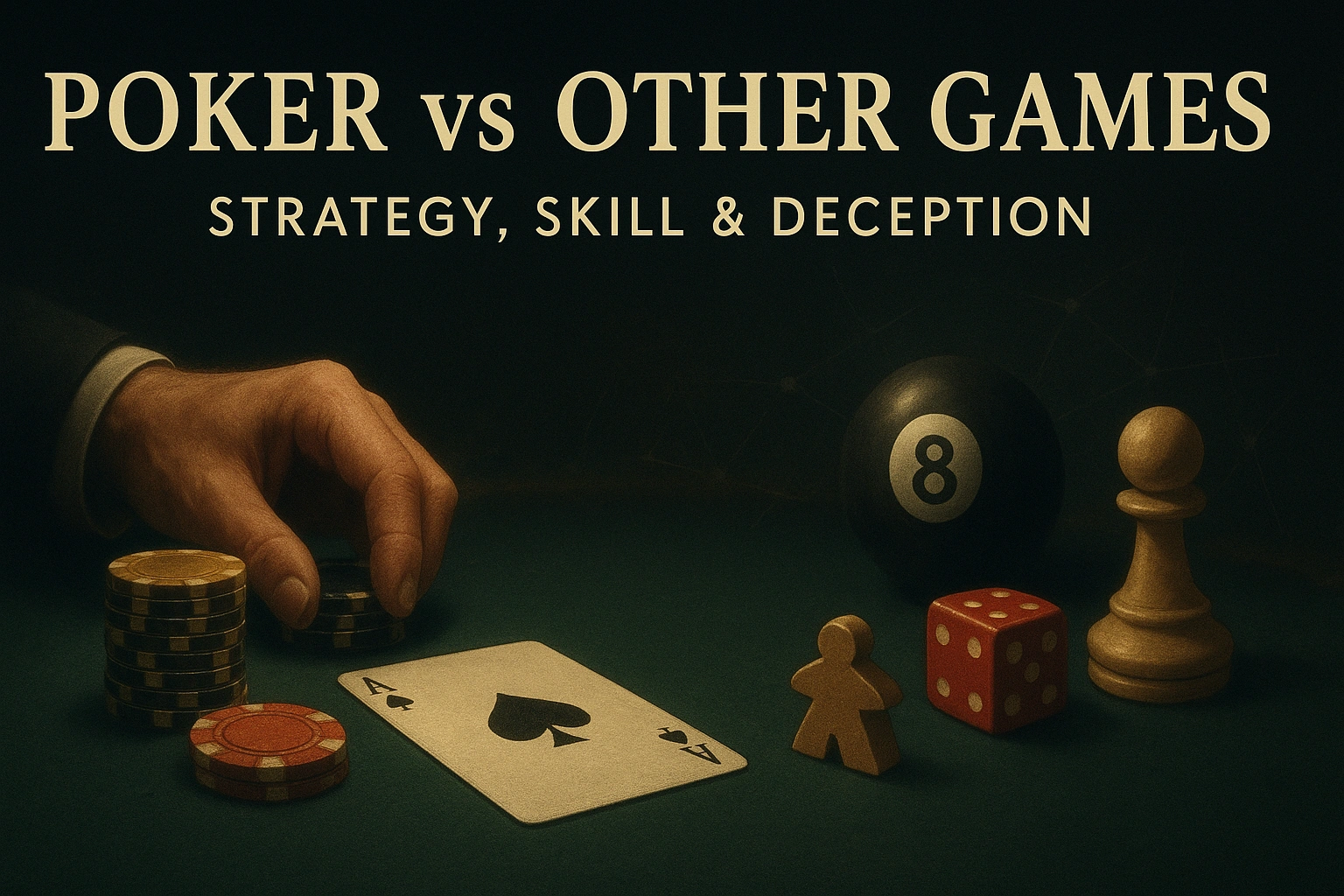

Poker is a game that has captivated players for generations. Its enduring appeal lies in its unique combination of skill, strategy, psychology, and a dash of luck. But how does poker stack up against other popular games, and why is it considered the ultimate test of mental prowess? In this article, we’ll explore what sets poker apart from games like chess, video games, and sports, and why it continues to be the gold standard for strategic competition.
Poker vs. other games
1. Skill vs. Luck: Striking the Perfect Balance
Unlike many games that rely predominantly on either skill or luck, poker strikes a delicate balance between the two. While luck may influence short-term outcomes (such as the cards you’re dealt), skill and strategy determine long-term success.
- Comparison with Chess: Chess is purely a game of skill where players have complete information about the board. Poker, on the other hand, involves hidden information and uncertain outcomes, requiring players to make decisions based on probabilities and psychology.
- Comparison with Lottery Games: Unlike lotteries, which are purely games of chance, poker rewards players who can consistently outthink and outmaneuver their opponents.
This blend of skill and luck makes poker uniquely challenging and keeps players engaged as they refine their strategies over time.
2. The Role of Psychology: Reading Opponents
In poker, mastering the mental game is as important as understanding the rules. The ability to read opponents, bluff convincingly, and manage your own emotions is a critical component of success.
- Comparison with Sports: While sports require physical prowess and strategy, poker is entirely mental, relying on keen observation and emotional control.
- Comparison with Video Games: Many competitive video games involve strategy, but the direct psychological interaction with opponents is less pronounced compared to poker’s face-to-face or online gameplay.
The psychological aspect of poker elevates it to a game where understanding human behavior is as crucial as understanding the cards.
3. Decision-Making Under Uncertainty
Poker is a game of incomplete information. Players must make decisions without knowing their opponents’ hands, relying on probability, experience, and intuition.
- Comparison with Chess: Chess provides all players with complete information, making it a game of deterministic strategy. Poker, by contrast, requires players to calculate risks and make decisions with incomplete data.
- Comparison with Video Games: Many video games allow for trial-and-error learning, whereas poker requires immediate, high-stakes decision-making where mistakes can be costly.
This aspect of poker sharpens critical thinking and teaches players to make calculated risks in uncertain situations—a skill applicable in real life.
4. Adaptability and Creativity
Poker players must constantly adapt their strategies based on the table dynamics, their opponents’ tendencies, and the changing state of the game. Creativity is key to staying unpredictable and outsmarting opponents.
- Comparison with Board Games: Most board games, like Settlers of Catan or Risk, have structured rules and limited variability. Poker’s fluid nature and player-driven decisions create endless possibilities.
- Comparison with Sports: While sports require adaptability, poker demands mental flexibility in every hand, as the game’s dynamics can shift dramatically with each new card.
5. Long-Term Strategy: The Test of Consistency
Winning at poker isn’t about a single hand or even a single session. It’s about consistently making the best decisions over the long term.
- Comparison with Games of Chance: Casino games like roulette or blackjack have fixed odds, and long-term success is dictated by luck. Poker, however, rewards players who can outthink their opponents and manage variance over time.
- Comparison with Sports: While sports seasons measure performance over time, poker requires sustained focus and strategic execution across countless games and tournaments.
6. Inclusivity and Accessibility
Poker is a game that transcends age, gender, and physical ability. It’s a game where anyone with the will to learn and the drive to improve can succeed.
- Comparison with Sports: Physical sports often have barriers related to age, fitness, or ability. Poker is a level playing field, where success depends solely on skill and strategy.
- Comparison with Esports: While esports are increasingly inclusive, they often have a steep learning curve and require technical equipment. Poker’s simplicity makes it accessible to anyone with a deck of cards or an internet connection.
7. The Thrill of Competition and Community
Poker combines individual achievement with a sense of camaraderie. Whether played casually with friends or competitively in tournaments, it fosters a unique social experience.
- Comparison with Chess: Chess lacks the social element of poker, where reading and interacting with opponents adds a layer of complexity.
- Comparison with Video Games: Online video games create communities, but poker’s face-to-face dynamics (even in online poker, through live chat or video) foster deeper personal connections.
Poker stands out as the ultimate test of skill and strategy because it combines the best elements of other games: the mental challenge of chess, the adaptability of sports, and the thrill of competition found in video games. Its blend of skill, psychology, and decision-making under uncertainty makes it a game like no other.
Whether you’re a seasoned player or new to the game, poker offers endless opportunities to challenge yourself, grow, and connect with others. So shuffle up, deal the cards, and discover why poker truly is the gold standard for strategic competition.
